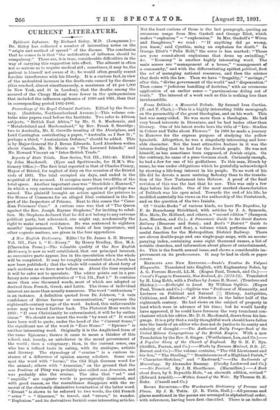A New English Dictionary. Edite I by Dr. James A.
H. Murray. Vol. III., Part 1, " E—Every." By Henry Bradley, Hon. M.A. (Clarendon Press.)—The valuable quality of the New English Dictionary is now so well established, that our principal interest, as successive parts appear, lies in the speculation when the whole will be completed. It may be roughly estimated that a fourth has now been published ; that the whole will consist of about forty of such sections as we have now before us. About the time required it will be safer not to speculate. The editor points out in a pre- fatory note some characteristics of " Vol. III., Part 1." It contains more than nine thousand words, most of which are adopted or derived from French, Greek, and Latin. The items of individual interest are more than usually numerous. The word " enthusiasm " is an instance. A definition quoted from Dr. Johnson, "A vain confidence of divine favour or communication," expresses the eighteenth-century usage of the word. Indeed, this unfavourable sense may be traced further back. The Platonist More wrote in 1650: " If ever Christianity be exterminated, it will be by enthu- siasm." We should now insert the words "by want of." It would have been well to quote, under the head of the " Current Sense," the significant use of the word in "Ecce Homo." "Epicure " is another interesting word. Originally it is the Anglicised form of the name Epicurus ; thence it came to mean a thinker of this school, and, loosely, an unbeliever in the moral government of the world ; then a voluptuary; then, in the current sense, one who has a refined taste in eating, with its analogue, artistic and literary. The etymology of " ermine " is a curious in- stance of a difference of opinion among scholars. Some con- nect the word with " harmo," the Old High German word for the animal; others with "Armenian," on the ground that the mus Ponticus of Pliny was probably also called mus Armenius, and was probably also the ermine. The idea that " eel " and " angnilla " are cognate words is peremptorily dismissed, and with good reason, as the resemblance disappears with the re- moval of the obviously diminutive termination of the latter word. "Errant" is shown to be referred to two words, the Old French " errer " = " itinerare," to travel, and " errare," to wander. " Euphuism" and its derivatives furnish some interesting articles.
Not the least curious of these is the last paragraph, quoting an erroneous usage from Mrs. Gaskell and George Eliot, which makes " euphuism " = " euphemism." In Mrs. Gaskell's " Wives and Daughters," we read : " If anything did go wrong, you know,' said Cynthia, using an euphuism for death." In George Eliot's "Felix Holt," the error is less marked: "Those are your round-about euphuisms that dress up swindling," &c. "Economy " is another highly interesting word. The main senses are "management of a house," "management of a community," and with the differentiating epithet political, first the art of managing national resources, and then the science that deals with the law. Then we have "frugality," " savings ;" after this, "divine government of the world" and " dispensation." Then comes " judicious handling of doctrine," with an erroneous application of an earlier sense = "parsimonious doling out of truth." The interest of a work such as this is nothing less than inexhaustible.


































 Previous page
Previous page